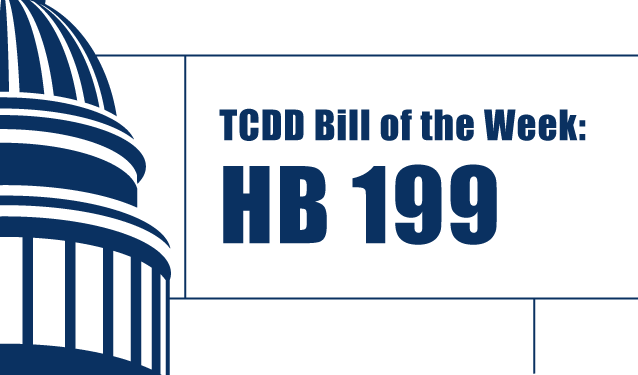HB 199
HB 199

For this weekly feature, the Texas Council for Developmental Disabilities (TCDD) profiles a noteworthy bill that is going through the legislative process. The bill may relate directly to TCDD’s Public Policy Priorities or another disability-related issue.
Table of Contents
Bill: House Bill (HB) 199, relating to a sales-and-use tax exemption for child and adult diapers
Bill Author: Rep. Donna Howard, House District 48 (Austin)
What does the bill do?
HB 199 would amend the tax code to include a sales-tax exemption for child or adult diapers and other absorbent products used to manage incontinence. The bill would also update a portion of the code with person-first language when describing individuals with disabilities.
If passed, HB 199 would take effect on Sept. 1, 2023. The change in law would not affect tax liability accruing before the bill’s effective date.
Background
Although diapers are medically necessary to prevent skin deterioration and satisfy sanitary needs, they are currently taxed as luxury goods at a rate between 6.25% and 8.25%. Health care supplies currently exempted from sales tax include insulin, hypodermic syringes or needles, prosthetic devices, colostomy appliances, blood-glucose monitoring test strips, hospital beds, and other items.
Statement from Rep. Donna Howard, bill author:

Statement from Rep. Donna Howard, bill author:

Where is the bill in the process?
On Feb. 23, 2022, HB 199 was referred to the House Committee on Ways and Means, where it waits to be scheduled for a public hearing.
Who supports the bill and why?
The following comments were taken from a House Committee on Ways and Means public hearing on April 24, 2019, on a bill identical to HB 199:
- Texas Health Care Association: Donovan Dekowski, the chief financial officer for Regency Integrated Health Services, spoke on behalf of the Texas Health Care Association and stated, “For many nursing home residents, adult briefs are really a necessity. They’re a necessity for dignity, but more importantly, they’re a necessity for the health of the residents.” Dekowski continued, “As we age, the skin becomes more susceptible to injury. In a skilled nursing facility, for the elderly patients you really need an adult brief, or diaper — we call them adult briefs in our industry — to wick the liquids away from the skin. And if you don’t wick the liquids away from the skin, what you end up with is skin deterioration, you end up with pressure ulcers and things like that, which we’re definitely trying to avoid. In my mind, adult briefs in the skilled nursing industry and adult briefs for frail and elderly actually become more of a medical necessity than any kind of vanity or luxury item that you would normally tax. And in our industry, we’re not taxed on medical items, we’re not taxed on medical supplies. I think in our industry adult briefs really are a medical supply, so it really doesn’t make sense that they are taxed.”
- Austin Diaper Bank: Holly McDaniel, the executive director of the Austin Diaper Bank, shared the story of a woman who visited the diaper bank in need of diapers for her son, a 7-month-old baby. The child’s diaper had not been changed since the night before, and when she tried to drop him off at day care, the facility wouldn’t accept the baby because she couldn’t provide them with five diapers. As a result, she had to miss work that day. “Not only did she lose a day’s wages, she still had to pay for day care, and that small business lost an employee for that day,” McDaniel said. “It’s this cyclical effect. It’s a diaper, but it actually affects the entire economy in each small little city and especially small businesses.” McDaniel described families desperately trying to make their budgets work by using alternative methods instead of diapers such as T-shirts and paper towels. She estimated that if the sales tax was eliminated on diapers and related items, the savings would cover the purchase of 26 more diapers a month. In closing, McDaniel stated, “Yes, diapers are small. It’s a small piece in a very large puzzle. But really you can put 26 diapers back into families’ budgets each month, and that actually can fix a lot of problems for the economy (and) for that family. It’s very simple.”
The following groups also registered their support for the 2019 legislation but provided no testimony: Children’s Hospital Association of Texas, Center for Public Policy Priorities (now Every Texan), and Methodist Healthcare Ministries of South Texas.
Who opposes the bill and why?
One person registered opposition to the identical bill in 2019 but provided no testimony.
How much will the bill cost?
In 2019, the Legislative Budget Board found that the passage of a bill identical to HB 199 would result in a loss of $92 million in state general revenue over the course of the biennium, and around $50 million per year moving forward. Local governments — including cities, transit authorities, counties, and special districts — would also lose revenue, according to the board.
Is there a Senate companion to the bill?
SB 340, authored by Sen. Drew Springer, is similar to HB 199 and is waiting to receive a hearing in the Senate Finance Committee.
Related bills
HB 300, by Rep. Donna Howard, would create a sales tax exemption for child diapers, baby wipes, baby bottles, feminine hygiene products, maternity clothing, and breast milk pumping products. As currently written, however, the bill would not exempt adult diapers from the sales tax. Filed on Feb. 23, it has been named as one of Speaker Dade Phelan’s legislative priorities for the Texas House.
Share this bill
TCDD created a Bill of the Week one-pager for HB 199 (PDF). This is a simplified explanation of the bill that you can share with your representative and personal network.
Stay informed
For the latest information and status of HB 199, follow the bill on the Texas Legislature Online. To receive future legislative updates from TCDD, subscribe to our newsletter or follow us on Twitter, Facebook, LinkedIn, and Instagram.
